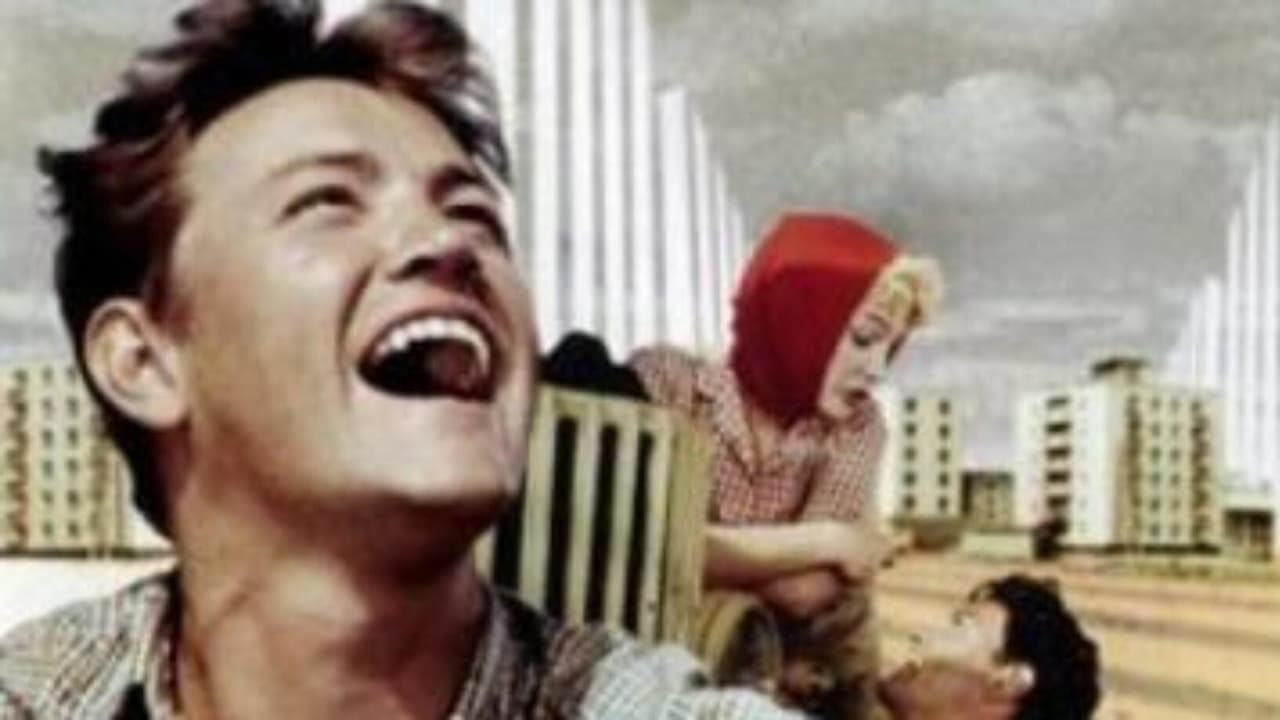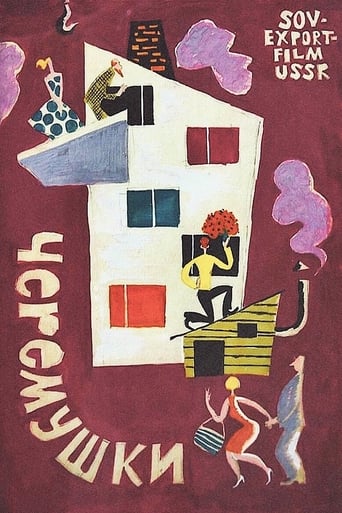



Good concept, poorly executed.
An absolute waste of money
A Brilliant Conflict
Strong acting helps the film overcome an uncertain premise and create characters that hold our attention absolutely.
View MoreStalin's favourite movie, one that he apparently saw over a hundred times, was Volga-Volga (1938), a chillingly optimistic musical set around a song writing competition held in Moscow. According to Danga Ranga's entertaining documentary East Side Story (1997), only 20 similar examples appeared from the eastern bloc over 40 years - a genre doomed through official indifference, hesitation over subject matter as well as the understandable inexperience of the filmmakers involved.In the late 1950s Shostokovich, who'd written a number of prestigious film scores since New Babylon (1929) as well as the landmark and scandalous opera Lady Macbeth Of Mtsenk, composed this musical comedy set amidst the newly arrived inhabitants of a half-built housing estate. It's a job of work to the great artist, not on the level of his more celebrated pieces, although his characteristic irony and gifts as an orchestrator makes him an ideal composer for the subject. If, in later years, he will say this operetta made him "cringe with shame" and term his collaborators Mass and Chervisnky as "just a couple of Soviet humourists," 'Cherry Town' nevertheless proves popular and in 1963 appears as the film Cheryomushki directed by Gerbert Rappaport.Communist musicals were rarely, if ever exported and even today I think this is the only example widely available with subtitles. It's a shame as, with all their shortcomings, from this example and snippets seen of others, they have a vaguely camp appeal. One longs to see Revue um Mitternacht (aka: Midnight Review), made the same year as the Shostokovich. Like Cherry Town, this is mildly satirical, a playful story about the problems in getting a musical project off the ground and then onto the screen in the first place. But whereas Revue wears its intentions, however lightly, on its sleeve Cherry Town, at least in its filmic incarnation, ruffles even fewer feathers. Perhaps its reticence is deliberate. Shostokovich had learnt the hard way, as had many Russians, to say one thing in his music and mean another. Having said that, revivals of Cherry Town have successful pointed up these elements more in his work set in stark housing estate where there was probably not a cherry tree in sight.The relatively slight plot concerns the initial struggles, and settling in, of several people into their new housing estate. They are principally a newly married couple as well as a blast engineer name of Boris - played here by the vaguely Danny Kaye-ish actor Vladimir Vasilyev - who has his bachelor eye on museum guide Lida (Olga Zabotkina), and the frustrations encountered by all. Despite the frustrations of incompetent officialdom - the estate manager Batabashkin is corrupt and his superior Drebyednystev is a bureaucrat whose second wife wants a bigger flat, expanding into that previously allocated to the hero and heroine - all eventually is settled good naturedly. 'Cherry Town' is a generic title apparently given by the appreciative inhabitants on any new housing estate and this one is a place full of flirtation, sun and song, mostly bright and breezy through the running time, even if as a filmed musical piece it misses the exuberance and smoothness of well-oiled American cinema. It's more revealing to compare it to the just as romantic Russian favourite Ironiya sudby, ili S legkim parom (aka: The Irony Of Fate) made a decade later. There love is also discovered on housing estates that (its key plot point) look exactly the same, due to the central control over Soviet builds. Such conformity means that, no matter in which city you find yourself, only love brings the unexpected in a regimented environment. But with Cherry Town, love is just the icing on the cake.Revivals of Cherry Town as a stage piece have proved how colourful and memorable a lot of Shostokovich's writing is - and in fact I found myself humming one of its tunes the day after viewing the DVD. If parts of the story were rooted in the then citizen's experience of reality (for instance the plight of the couple, re-housed at last in Cherry Town, married for some months already but previously reduced to meeting at concerts and train stations), the film also has prominent elements of fantasy. Notably a scene dreamt occupying the new flats when the main two characters dance in and out of various costumes or, most strikingly, the very end of the film as hero Boris is literally blasted into the arms of his sweetheart, watching from her newly allocated balcony above. Marching comrades or deputations do not solve problems, and counter-revolutionaries are not marched off for harsh punishment to achieve a perfect society this time; instead a large part of the wrapping up of business is played by the whimsy of a 'magic bench'. Even though most who see the film these days will never have lived in the society of the Soviets, in retrospect there's faux nostalgia to be had from the colours, décor and downright cheerfulness shown by all concerned.Something of an oddity then, but never the less enjoyable. Cherry Town is shot with the garish colours familiar to those who have seen other east European or DEFA productions from the time. The print here shows some signs of use with lines and speckles, but this is not enough to impair the pleasure it gives. The UK edition also offers some unhelpful extras, notably a small extract from Lady Macbeth Of Mtsenk, as well as a brief documentary on the composer's creative tribulations of the 1930s, and a Shostokovich chronology - but the disc fails to bring the story up to date with any real context for Cherry Town, odd to say the least. Both film and music lovers need more.
View More"Cheryomushki" (1963) directed by Gerbert Rappaport - is a screen adaptation of the Musical (operetta) written by one of the greatest Composers of the 20th Century, Dmitriy Shostakovich. The music, indeed is splendid, the voices are marvelous and some of the duets are simply great (Lida and Boris singing and dancing in the costumes of the different epochs). The film itself is a typical Soviet comedy of the 60s which plot revolves around four couples who all try to move into an apartment in the new neighborhood, Cherymushki. This comedy is entertaining and well acted but too sugary and lightweight to be truly memorable.
View More